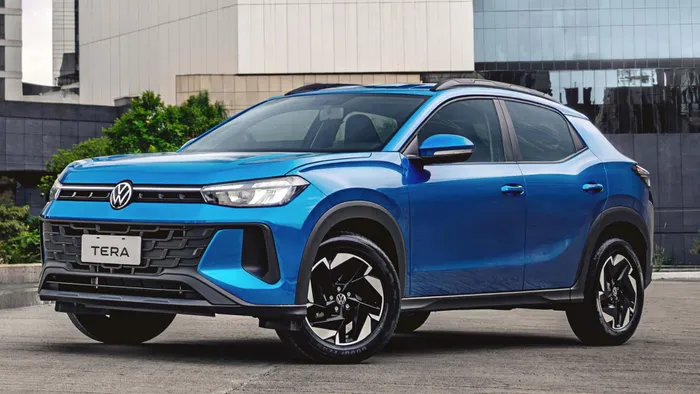
The South African built VW Tengo will be closely based on the Brazilian-developed Tera.
Image: Supplied
Volkswagen is reshaping its global product and production strategy, and Africa is set to play an increasingly important role.
While the flagship Touareg will be sold until 2027, the company is preparing for the launch of the new Tengo, which will be built in South Africa from 2027.
The Tengo will be closely based on the Brazilian-developed VW Tera, and the subcompact crossover will slot in below the VW T-Cross.
End of the line for Touareg
According to Martina Biene, Chairperson and Managing Director of Volkswagen Group Africa (VWGA), the Touareg’s demise has less to do with electrification and more to do with economics.
“The Touareg was the only car on its platform,” she explained. “Unlike the MQB27 platform, which underpins models such as the Polo and T-Cross, or the MQB37, which carries the Golf, Tayron and Tiguan, the Touareg shares its architecture only with the Porsche Cayenne. Maintaining an extra platform and electronic architecture for such low volumes was simply too costly.”
The facelifted Touareg that reached the market came at a significant investment, but with low sales and rising CO₂ penalties in Europe, it could not be justified.
Export volumes of smaller models such as the Polo built at the Kariega plant and also the sole global manufacturer of the Polo GTI, are expected to decline as European emissions targets tighten, adding pressure on VWGA to develop new markets.
Project Tengo
This is where the Tengo comes in.
Earlier this year, VWGA’s Kariega plant closed for four weeks for installations and upgrades, including new robots in the body shop. Press tools have already arrived from Brazil and China, and the first test bodies are due by the end of 2025. Pre-series production is scheduled for early 2026, with full market launch in 2027.
Engines for the Tengo will be sourced from Brazil. “For Africa, we still need engines that can cope with lower-quality fuel,” Biene said. These so-called “bad fuel” engines - built to EU3 standards without catalytic converters or petrol particulate filters - remain necessary in regions where fuel standards lag behind Europe.

Martina Biene, Chairperson and Managing Director of Volkswagen Group Africa.
Image: Supplied
Into Africa
Biene believes Africa represents Volkswagen’s next growth frontier.
Despite a population of 1.4-billion, the continent accounted for only 1.2-million new car sales last year - 570,000 in South Africa, 490,000 in North Africa, and fewer than 200,000 in sub-Saharan Africa.
Biene says many governments are now deciding whether to continue relying on used imports or to industrialise.
“Automotive is one of the biggest industries that drives industrialisation, local content, local component manufacturing, local assembly,” she said. “The question for many African countries is whether they want to remain dependent on used imports or take the leap into building new ones.”
VWGA already has assembly operations in Ghana, Kenya and Rwanda, and through Biene’s role as president of the African Association of Automotive Manufacturers (AAAM). The industry is pushing for full implementation of the African Continental Free Trade Agreement and rules of origin that require at least 40% local value added, to ensure genuine localisation rather than pure assembly.
All things electric
Electrification is also on the agenda, but with caution.
Battery electric vehicle (BEV) uptake in South Africa remains very limited. “The environment here is not yet conducive for battery-electric vehicles,” Biene admitted.
Instead, Volkswagen will introduce a layered approach: mild hybrids followed later by full hybrids, and eventually plug-in hybrids.
What’s next?
Looking ahead, Biene expects South Africa’s role to shift away from being an export hub to Europe and towards supplying Africa and other global markets.
“The dream and the prospect is to offset exports to Europe with exports to Africa,” she said, stressing that growth of the domestic market remains critical under the South African Automotive Master Plan.
As the Touareg bows out, the locally built Tengo represents more than just a new model. It symbolises Volkswagen’s long-term commitment to Africa’s automotive future, and Biene’s conviction that the continent is ready to evolve into a hub for new-car manufacturing and sales.